中美文化差异(CultureDifference)
- 格式:pdf
- 大小:20.54 KB
- 文档页数:12
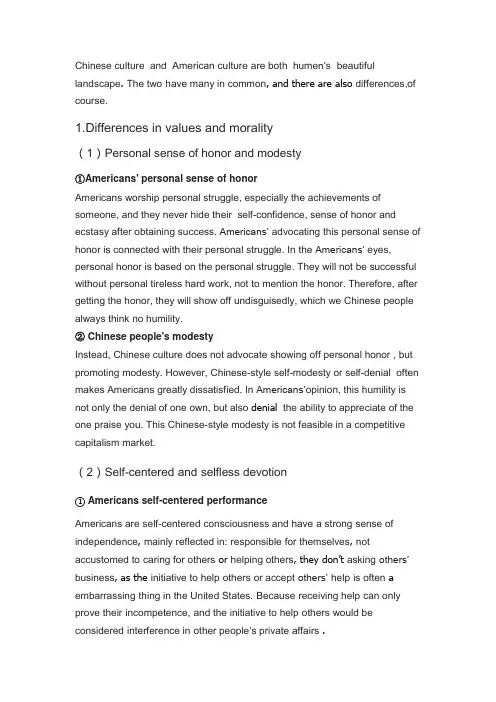
Chinese culture and American culture are both hume n’s beautiful landscape. The two have many in common, and there are also differences,of course.1.Differences in values and morality(1)Personal sense of honor and modesty①Americans' personal sense of honorAmericans worship personal struggle, especially the achievements of someone, and they never hide their self-confidence, sense of honor and ecstasy after obtaining success. Americans’ advocating this personal sense of honor is connected with their personal struggle. In the Americans’ eyes, personal honor is based on the personal struggle. They will not be successful without personal tireless hard work, not to mention the honor. Therefore, after getting the honor, they will show off undisguisedly, which we Chinese people always think no humility.② Chinese people's modestyInstead, Chinese culture does not advocate showing off personal honor , but promoting modesty. However, Chinese-style self-modesty or self-denial often makes Americans greatly dissatisfied. In Americans’opinion, this humility is not only the denial of one own, but also denial the ability to appreciate of the one praise you. This Chinese-style modesty is not feasible in a competitive capitalism market.(2)Self-centered and selfless devotion① Americans self-centered performanceAmericans are self-centered consciousness and have a strong sense of independence, mainly reflected in:responsible for themselves, not accustomed to caring for others or helping others, they don’t asking others’business, as the initiative to help others or accept others’help is often a embarrassing thing in the United States.Because receiving help can only prove their incompetence,and the initiative to help others would be considered interference in other people’s private affairs .② Chinese people's selfless dedicationChina's Code of Conduct is “whether I am useful to society and others ." Personal values are reflected in the dedication out. Chinese culture respected a noble sentiment - selfless dedication. In China, helping others initiatively, giving them considerate care is a virtue.So Chinese people concerned about everything, including personal affairs, family affairs,national affairs, even the world affairs! And this would be regarded as "meddling" in the United States.(3)On individual freedom and solidarity①American individual freedomAmericans cherish individual freedom,like arbitrariness, come alone and go alone,do not want to be restricted.In fact, this has some ties with the United States national conditions.the United States always advocates democracy, promotes freedom and science.In the U.S., the spirit of individualism appeared very early. Harsh living environment developed the American independent personality.Therefore, this independent spirit from the early colonial period has continued ever since, becoming one of the spirits believed in by Americans.②China's unity and cooperationChinese cu lture emphasize on collectivism more, it advocates that individual interests should be subordinated to the collective interests, all members should go together through thick and thin consisitently. Confucius ever said: " Sacrifice our lives for justice ," which is a extreme example to reflects the thoughts of “Weight overall, light individual”.2.Differences in family education(1)Differences between Chinese and American educational tradition① American pays much attention to the practice of basic education and the form of the classroom instruction creationAmerican schools focus on heuristic teaching ,especially in personality development and self-expression, foster students’ operation ability, without emphasis on test scores. In the classroom, teachers guide students to think independently in an active atmosphere. Homework is few and very flexible whose main purpose is to exercise the abilities of students and to develop their thinking habits.② Chinese basic education stresses knowledge, classroom instruction focuses on indoctrinationIn Chinese schools, The schools adopt a unified teaching mode, unified learning content, unified examination and standard answers. This greatly stifle the students' innovative spirit. Under the examination-oriented education model, teachers and students entirely aimed at the examination. Teaching content entirely regards the "Outline" as the basis. In the teaching process, Chinese teachers irrigate blindly, and students take those old-fashioned knowledge by rote.(2)The purpose of the Sino-US Family Education① American families educational expectations are not highThe aim of education of American families is to raise their children to be a "social person" who is able to adapt to a variety of environments . The expectations of this purpose is not high, so the American parents can treat their children's education more easily. Children's positive ingredient in their personality can be exhumed maximally to achieve self-worth.② Chinese families educational expectations are very high, and always with strong utilitarianIn Chinese family, the purpose of education is to train their children to besuccessful , which means they will get a good career, have a great expectations, possess much money ,and their life can always be smooth sailing. For this reas on, Chinese parents are particularly concerned about the child's academic performance. The only requirement for children is to concentrate on learning quietly, ignoring the children’s other talents, limiting their creativity.3.Differences in social etiquette(1)Etiquette① Comparison of Sino-US Politeness WordsChinese people like to ask the name, age ,job ,hometown and so on of each other during their first meet. However , Americans hate people ask such questions like age and income, they think it’s private affair. Chinese people love greeting acquaintances like: Have you eaten ? Where to go? Work ah? And so on. In our view, this is a polite greetings, and if you do it to Americans, they will think you want to ask him to dinner, or interfere in their private affairs, and feel you disrespectful. Americans usually greet this way:”Hello! How do you do?”or”Nice to meet you! ”.② Comparison of attitude to accepting kind words of Sino-US Research shows that Chinese people don’t like to praise themselves. But Chinese-style self-modesty or self-denial often makes Americans greatly dissatisfied.For others’ praise, Chinese people usually express his humility with a humble words like "ashamed", "where", "not so good" and so on. And Americans are always very happy to answer “thank you” to show acceptance.③ Comparison of Sino-US ceremonial occasionsChinese people do not often say "thanks" to close friends and family members. They think you aloof if you do. But Americans use “thank you” all day, even among friends and family members.(2) Customs① Sino-US attitude to giftsChinese people tend to put a gift aside without much looking when he receives a gift, fearing that others say him greedy. Americans always open his gift and claim it’s good in front of the guests immediately.② Sino-US attitude to hospitalityChinese people is quite hospitable, persuading guests to eat dishes or drink wines over and over again on the table, which Americans find difficult to deal with. The American habit is: Please help yourself! when China sent to the guests, the host usually say:! “Be careful, good-bye, go well”. The Americans only say “Bye! See you later!”In short, the American culture is outgoing culture which is built on the rule , while Chinese culture is introverted culture which is built on the culture.。

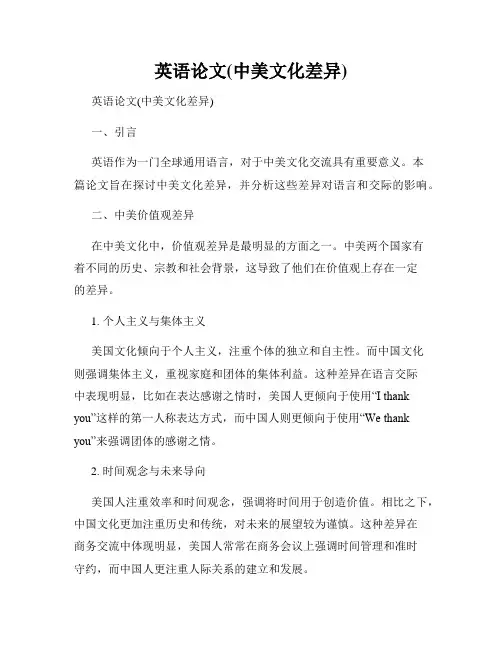
英语论文(中美文化差异)英语论文(中美文化差异)一、引言英语作为一门全球通用语言,对于中美文化交流具有重要意义。
本篇论文旨在探讨中美文化差异,并分析这些差异对语言和交际的影响。
二、中美价值观差异在中美文化中,价值观差异是最明显的方面之一。
中美两个国家有着不同的历史、宗教和社会背景,这导致了他们在价值观上存在一定的差异。
1. 个人主义与集体主义美国文化倾向于个人主义,注重个体的独立和自主性。
而中国文化则强调集体主义,重视家庭和团体的集体利益。
这种差异在语言交际中表现明显,比如在表达感谢之情时,美国人更倾向于使用“I thank you”这样的第一人称表达方式,而中国人则更倾向于使用“We thank you”来强调团体的感谢之情。
2. 时间观念与未来导向美国人注重效率和时间观念,强调将时间用于创造价值。
相比之下,中国文化更加注重历史和传统,对未来的展望较为谨慎。
这种差异在商务交流中体现明显,美国人常常在商务会议上强调时间管理和准时守约,而中国人更注重人际关系的建立和发展。
三、语言差异中美文化差异也在语言使用上得到体现。
1. 礼貌用语中美两国在礼貌用语方面存在差异。
美国人更倾向于使用直接的表达方式,比如“Please pass the salt”。
而中国人常常使用委婉的方式,比如“麻烦你帮我递一下盐”。
这种差异反映了中美两国之间在社交场合中的不同习惯和礼貌观念。
2. 言语间断和暗示中美文化中存在着对言语间断和暗示的不同需求。
美国人更倾向于直接了当地表达自己的意图,喜欢在交流中保持比较连贯的语言流程。
而中国人更喜欢使用间接的方式表达自己的意图,有时候在表达上更多地依靠暗示和上下文的理解。
这种差异在商务谈判和日常社交中都能观察到。
四、沟通方式差异受到文化差异的影响,中美人民在交际中采用不同的沟通方式。
1. 非语言表达在非语言表达上,中美文化也存在着差异。
美国人更加直接和开放地表达情感,通过面部表情、肢体动作和眼神交流来表达自己的意思。
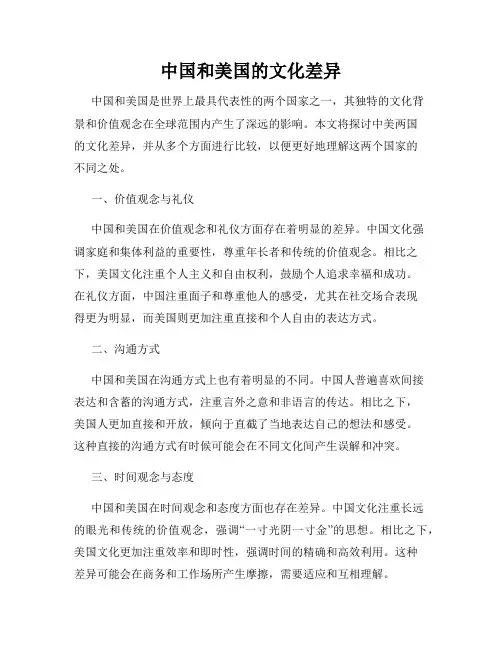
中国和美国的文化差异中国和美国是世界上最具代表性的两个国家之一,其独特的文化背景和价值观念在全球范围内产生了深远的影响。
本文将探讨中美两国的文化差异,并从多个方面进行比较,以便更好地理解这两个国家的不同之处。
一、价值观念与礼仪中国和美国在价值观念和礼仪方面存在着明显的差异。
中国文化强调家庭和集体利益的重要性,尊重年长者和传统的价值观念。
相比之下,美国文化注重个人主义和自由权利,鼓励个人追求幸福和成功。
在礼仪方面,中国注重面子和尊重他人的感受,尤其在社交场合表现得更为明显,而美国则更加注重直接和个人自由的表达方式。
二、沟通方式中国和美国在沟通方式上也有着明显的不同。
中国人普遍喜欢间接表达和含蓄的沟通方式,注重言外之意和非语言的传达。
相比之下,美国人更加直接和开放,倾向于直截了当地表达自己的想法和感受。
这种直接的沟通方式有时候可能会在不同文化间产生误解和冲突。
三、时间观念与态度中国和美国在时间观念和态度方面也存在差异。
中国文化注重长远的眼光和传统的价值观念,强调“一寸光阴一寸金”的思想。
相比之下,美国文化更加注重效率和即时性,强调时间的精确和高效利用。
这种差异可能会在商务和工作场所产生摩擦,需要适应和互相理解。
四、教育体系中国和美国的教育体系也有着显著的差异。
中国的教育体系注重应试和记忆,学生在学校中需要完成大量的功课和考试。
相比之下,美国的教育体系更注重培养学生的创造力和批判性思维能力,倡导学生的自主学习和兴趣发展。
五、饮食文化中国和美国的饮食文化也存在巨大差异。
中国饮食注重均衡和营养,尤其强调米饭、面食、蔬菜和豆制品的摄入。
相比之下,美国饮食偏向快餐和高热量食物,以肉类和面包为主食。
这种饮食差异也反映了两国人们对于健康和饮食观念的不同认知。
六、宗教信仰和节日庆祝中国和美国在宗教信仰和节日庆祝方面存在明显的差异。
中国主要信仰佛教、道教和儒家思想,传统节日如春节、端午节、中秋节等与宗教信仰有着紧密的联系。
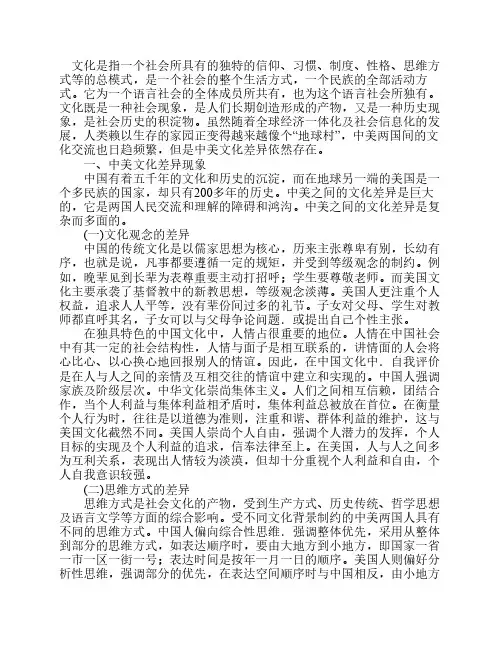
文化是指一个社会所具有的独特的信仰、习惯、制度、性格、思维方式等的总模式,是一个社会的整个生活方式,一个民族的全部活动方式。
它为一个语言社会的全体成员所共有,也为这个语言社会所独有。
文化既是一种社会现象,是人们长期创造形成的产物,又是一种历史现象,是社会历史的积淀物。
虽然随着全球经济一体化及社会信息化的发展,人类赖以生存的家园正变得越来越像个“地球村”,中美两国间的文化交流也日趋频繁,但是中美文化差异依然存在。
一、中美文化差异现象 中国有着五千年的文化和历史的沉淀,而在地球另一端的美国是一个多民族的国家,却只有200多年的历史。
中美之间的文化差异是巨大的,它是两国人民交流和理解的障碍和鸿沟。
中美之间的文化差异是复杂而多面的。
(一)文化观念的差异 中国的传统文化是以儒家思想为核心,历来主张尊卑有别,长幼有序,也就是说,凡事都要遵循一定的规矩,并受到等级观念的制约。
例如,晚辈见到长辈为表尊重要主动打招呼;学生要尊敬老师。
而美国文化主要承袭了基督教中的新教思想,等级观念淡薄。
美国人更注重个人权益,追求人人平等,没有辈份间过多的礼节。
子女对父母、学生对教师都直呼其名,子女可以与父母争论问题.或提出自己个性主张。
在独具特色的中国文化中,人情占很重要的地位。
人情在中国社会中有其一定的社会结构性,人情与面子是相互联系的,讲情面的人会将心比心、以心换心地回报别人的情谊。
因此,在中国文化中.自我评价是在人与人之间的亲情及互相交往的情谊中建立和实现的。
中国人强调家族及阶级层次。
中华文化崇尚集体主义。
人们之间相互信赖,团结合作,当个人利益与集体利益相矛盾时,集体利益总被放在首位。
在衡量个人行为时,往往是以道德为准则,注重和谐、群体利益的维护,这与美国文化截然不同。
美国人崇尚个人自由,强调个人潜力的发挥,个人目标的实现及个人利益的追求,信奉法律至上。
在美国,人与人之间多为互利关系,表现出人情较为淡漠,但却十分重视个人利益和自由,个人自我意识较强。
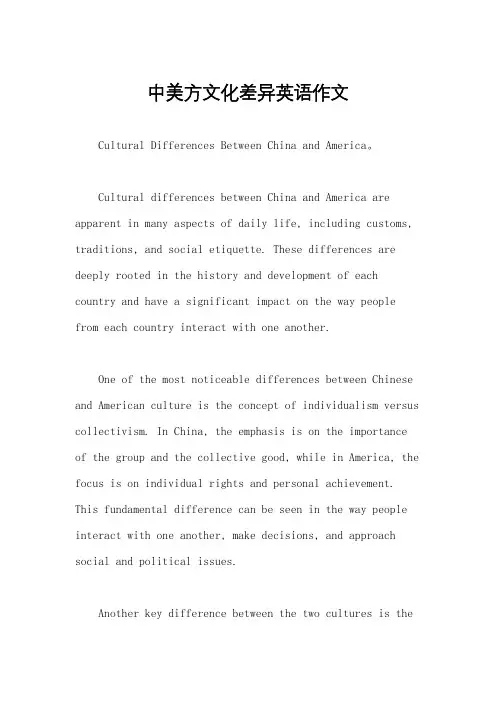
中美方文化差异英语作文Cultural Differences Between China and America。
Cultural differences between China and America are apparent in many aspects of daily life, including customs, traditions, and social etiquette. These differences are deeply rooted in the history and development of each country and have a significant impact on the way people from each country interact with one another.One of the most noticeable differences between Chinese and American culture is the concept of individualism versus collectivism. In China, the emphasis is on the importance of the group and the collective good, while in America, the focus is on individual rights and personal achievement. This fundamental difference can be seen in the way people interact with one another, make decisions, and approach social and political issues.Another key difference between the two cultures is theconcept of time. In China, time is often viewed as cyclical and flexible, with an emphasis on relationships and the present moment. In contrast, Americans tend to view time as linear and structured, with a focus on efficiency and productivity. This can lead to misunderstandings and frustration when people from both cultures work together or communicate with one another.Additionally, the role of family and hierarchy is another area where Chinese and American culture diverge. In China, family ties are extremely important, and there is a strong emphasis on respecting elders and maintaining harmony within the family unit. In America, individuals are encouraged to be independent and make their own choices, often leading to a more relaxed approach to family dynamics and hierarchy.Furthermore, communication styles differ significantly between the two cultures. In China, indirect communication and nonverbal cues are often used to convey messages and maintain harmony in social interactions. In America, direct communication and assertiveness are valued, and people areencouraged to speak their minds and express their opinions openly.In terms of social etiquette, there are also notable differences between Chinese and American culture. For example, in China, it is customary to show deference and respect to others, especially those in positions of authority. In America, there is a greater emphasis on equality and individual rights, leading to a more casualand informal approach to social interactions.Despite these differences, it is important to recognize that both Chinese and American cultures have their own unique strengths and values. By understanding and appreciating these differences, people from both cultures can learn from one another and build stronger, more harmonious relationships.In conclusion, the cultural differences between China and America are vast and complex, impacting every aspect of daily life. By recognizing and respecting these differences,people from both cultures can work together to bridge the gap and build stronger, more inclusive communities.。
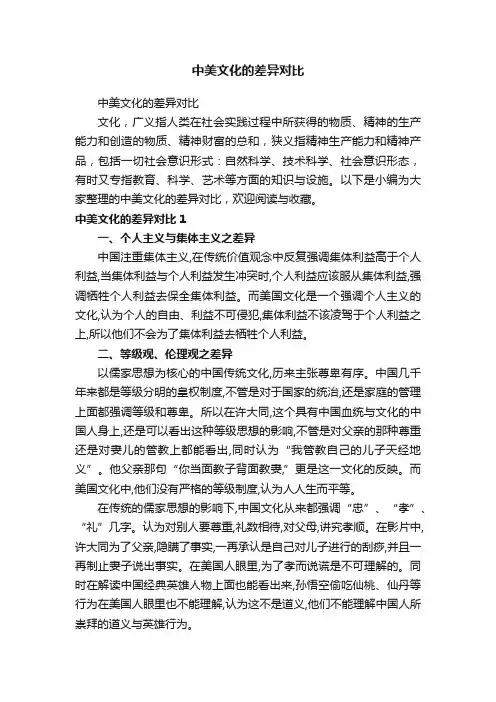
中美文化的差异对比中美文化的差异对比文化,广义指人类在社会实践过程中所获得的物质、精神的生产能力和创造的物质、精神财富的总和,狭义指精神生产能力和精神产品,包括一切社会意识形式:自然科学、技术科学、社会意识形态,有时又专指教育、科学、艺术等方面的知识与设施。
以下是小编为大家整理的中美文化的差异对比,欢迎阅读与收藏。
中美文化的差异对比1一、个人主义与集体主义之差异中国注重集体主义,在传统价值观念中反复强调集体利益高于个人利益,当集体利益与个人利益发生冲突时,个人利益应该服从集体利益,强调牺牲个人利益去保全集体利益。
而美国文化是一个强调个人主义的文化,认为个人的自由、利益不可侵犯,集体利益不该凌驾于个人利益之上,所以他们不会为了集体利益去牺牲个人利益。
二、等级观、伦理观之差异以儒家思想为核心的中国传统文化,历来主张尊卑有序。
中国几千年来都是等级分明的皇权制度,不管是对于国家的统治,还是家庭的管理上面都强调等级和尊卑。
所以在许大同,这个具有中国血统与文化的中国人身上,还是可以看出这种等级思想的影响,不管是对父亲的那种尊重还是对妻儿的管教上都能看出,同时认为“我管教自己的儿子天经地义”。
他父亲那句“你当面教子背面教妻,”更是这一文化的反映。
而美国文化中,他们没有严格的等级制度,认为人人生而平等。
在传统的儒家思想的影响下,中国文化从来都强调“忠”、“孝”、“礼”几字。
认为对别人要尊重,礼数相待,对父母,讲究孝顺。
在影片中,许大同为了父亲,隐瞒了事实,一再承认是自己对儿子进行的刮痧,并且一再制止妻子说出事实。
在美国人眼里,为了孝而说谎是不可理解的。
同时在解读中国经典英雄人物上面也能看出来,孙悟空偷吃仙桃、仙丹等行为在美国人眼里也不能理解,认为这不是道义,他们不能理解中国人所崇拜的道义与英雄行为。
三、当前利益与长远利益之差异中国是一个在乎长远利益的国家,要看长远利益,当前利益服从长远利益等思想已经深入到了中国的传统文化中。
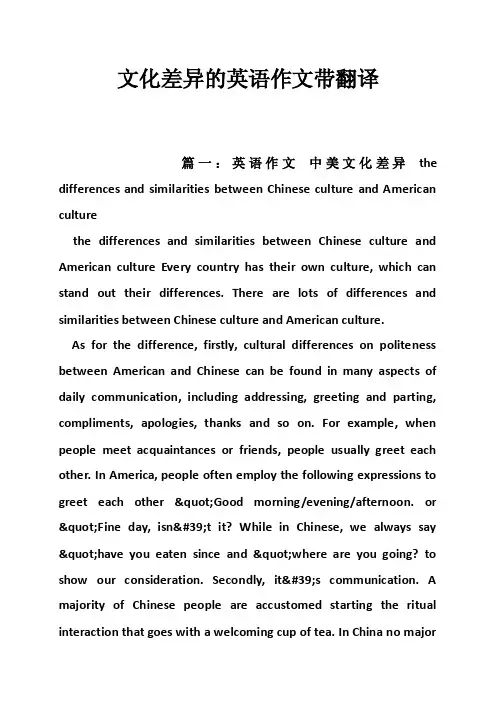
文化差异的英语作文带翻译篇一:英语作文中美文化差异the differences and similarities between Chinese culture and American culturethe differences and similarities between Chinese culture and American culture Every country has their own culture, which can stand out their differences. There are lots of differences and similarities between Chinese culture and American culture.As for the difference, firstly, cultural differences on politeness between American and Chinese can be found in many aspects of daily communication, including addressing, greeting and parting, compliments, apologies, thanks and so on. For example, when people meet acquaintances or friends, people usually greet each other. In America, people often employ the following expressions to greet each other "Good morning/evening/afternoon. or "Fine day, isn't it? While in Chinese, we always say "have you eaten since and "where are you going? to show our consideration. Secondly, it's communication. A majority of Chinese people are accustomed starting the ritual interaction that goes with a welcoming cup of tea. In China no majorbusiness is conducted without eye contact, requiring face-to-face conversation. However, in America, a final agreement will normally be signed in person. However, people are meeting increasingly on television screens, conducting teleconferences to settle problems not only in this country but also-by satellite-internationally.In spite of they have these differences, they have some similarities. In the china we think when we do some important things, we must spendsome. American for the most part costs a part time in important things. So in the culture of deal to in significant things, China and America has some similarities.In my opinion, we must respect the different culture.篇二:中西方文化差异英语作文In my view, it is not surprising that Mr. Jones and Mr. Wang had a so unpleasant conversation, because it caused by the different culture between East and West.Modesty is one of the national characters of Chinese people, which can be proved by those stories about modesty in the history of China. When praised in public, the Chinese may deny it to show the modesty, though he is happy to hear that. However, the Westerner may just say “thank you”to express happiness.If I were Mr. Wang, I would say “Thank you for your praise, and Iwill keep working hard to do better”. As far as I am concerned, excessive modesty is just hubris, so we should receive the praise with happiness and do better.If I were the boss, I would study the different culture more to understand the staff. As the old saying goes, do in Rome as Rome does. So only if the boss know the difference in the culture and do the right things, can he motivate the staff more appropriately to make more money.篇三:英语作文-东西方文化差异-Cultural differencesCultural differencesThere are plenty of. people in the world. They come from different countried, have theirown race, belief and way of life. What is more, their culture is different from others'. So,there is no doubt that cultural difference exist among lots of countries, especially betweeneastern and western countries.Compared with the way of life, eastern people always have a bath in the evening or atnight in order to relax themselves after one-day's hard work while western people take abath in the morning. so as to keep freshly for the whole day. Ingeneral, it is true,especially for Chinese people. We, Chinese people would like to take baths at night ratherthan in the morning. It is a kind of habits we behave all the time.Compared with the relationships, differences are as follow: firstly, eastern people like tomake friends, sometimes through their friends, parents, relatives. While western peoplebehave a little shyly. They do not want to make friends all the time. Secondly, easternpeople would like to hang out with the person they do not know about quite a lot. whilewestern people just like going out with the person whom they get along well with.Finally, eastern people have much more friends than western people for their quitedifferent way of getting along with. their friends. There is no doubt that eastern peopleare more outgoing than western people, so I agree with these a lot.As for way of solving problems, eastern people always deal with things indirectly. Theypay much attention to many things around them, and always workfor a long time to solvethe problem. However, western people just go straight the heart of the problem and solveit directly and efficiently. As far as I am concerned, this difference between eastern andwestern people is quite normal and correct. Eastern people, especially Chinese peoplecare about things around them a lot, they always want to satisfy everyone's need, so thatthey spend much more time to solve a problem than western people.As for way of thinking, people in eastern areas usually think indirectly. They used tothink about the things around them a lot and try to deal with things in a reasonable evenperfect way. However, in comparison with the eastern people, people in the western areasoften think directly. They pay less attention to the things around them and care muchmore about themselves. Honestly speaking, I disagree to this.In my opinion, everyone isspecial and has their right and obligations to do things. There isno need for us to critiseothers and what we should do is to respect their own. decision.There are a lot of differences between easte(转自: 千叶帆文摘:文化差异的英语作文带翻译)rn and western culture. These are the symbolsof their own characteristics and we need time to dig out more differences so as to learnmore about them. Most importantly, we must respect their culture firstly!。
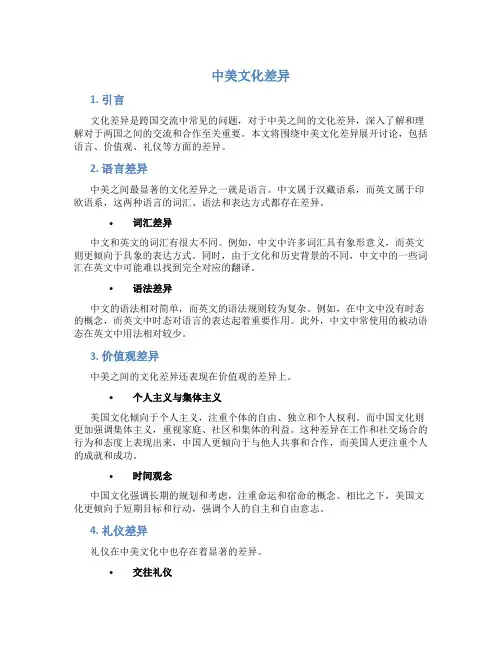
中美文化差异1. 引言文化差异是跨国交流中常见的问题,对于中美之间的文化差异,深入了解和理解对于两国之间的交流和合作至关重要。
本文将围绕中美文化差异展开讨论,包括语言、价值观、礼仪等方面的差异。
2. 语言差异中美之间最显著的文化差异之一就是语言。
中文属于汉藏语系,而英文属于印欧语系,这两种语言的词汇、语法和表达方式都存在差异。
•词汇差异中文和英文的词汇有很大不同。
例如,中文中许多词汇具有象形意义,而英文则更倾向于具象的表达方式。
同时,由于文化和历史背景的不同,中文中的一些词汇在英文中可能难以找到完全对应的翻译。
•语法差异中文的语法相对简单,而英文的语法规则较为复杂。
例如,在中文中没有时态的概念,而英文中时态对语言的表达起着重要作用。
此外,中文中常使用的被动语态在英文中用法相对较少。
3. 价值观差异中美之间的文化差异还表现在价值观的差异上。
•个人主义与集体主义美国文化倾向于个人主义,注重个体的自由、独立和个人权利。
而中国文化则更加强调集体主义,重视家庭、社区和集体的利益。
这种差异在工作和社交场合的行为和态度上表现出来,中国人更倾向于与他人共事和合作,而美国人更注重个人的成就和成功。
•时间观念中国文化强调长期的规划和考虑,注重命运和宿命的概念。
相比之下,美国文化更倾向于短期目标和行动,强调个人的自主和自由意志。
4. 礼仪差异礼仪在中美文化中也存在着显著的差异。
•交往礼仪在交往方面,中美文化对待他人的方式存在差异。
美国文化注重直接和开放的沟通,强调个人的自由表达。
相比之下,中国文化更加注重面子和尊重,倾向于间接的表达方式。
•餐桌礼仪在餐桌礼仪方面,中美之间有着明显的不同。
中国文化注重团体用餐,并有明确的席次和规则,如先长者后晚辈就餐等。
而美国文化则更加注重个体的用餐习惯和自主权,不强调严格的规范。
5. 结论中美文化差异是跨国交流中常见的问题,了解和尊重彼此的文化差异对于促进两国之间的交流和合作至关重要。
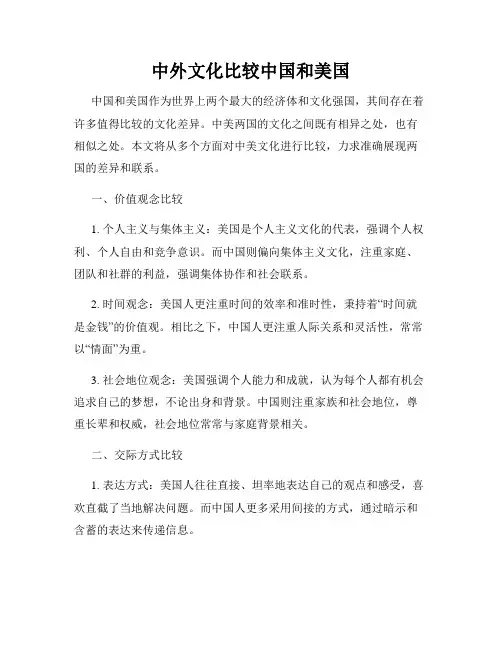
中外文化比较中国和美国中国和美国作为世界上两个最大的经济体和文化强国,其间存在着许多值得比较的文化差异。
中美两国的文化之间既有相异之处,也有相似之处。
本文将从多个方面对中美文化进行比较,力求准确展现两国的差异和联系。
一、价值观念比较1. 个人主义与集体主义:美国是个人主义文化的代表,强调个人权利、个人自由和竞争意识。
而中国则偏向集体主义文化,注重家庭、团队和社群的利益,强调集体协作和社会联系。
2. 时间观念:美国人更注重时间的效率和准时性,秉持着“时间就是金钱”的价值观。
相比之下,中国人更注重人际关系和灵活性,常常以“情面”为重。
3. 社会地位观念:美国强调个人能力和成就,认为每个人都有机会追求自己的梦想,不论出身和背景。
中国则注重家族和社会地位,尊重长辈和权威,社会地位常常与家庭背景相关。
二、交际方式比较1. 表达方式:美国人往往直接、坦率地表达自己的观点和感受,喜欢直截了当地解决问题。
而中国人更多采用间接的方式,通过暗示和含蓄的表达来传递信息。
2. 礼貌和尊重:美国人强调个人权利和自由,注重平等待人,喜欢称呼对方的姓名。
而中国人注重尊重和礼貌,常常使用敬语和尊称。
3. 人际关系:美国人的人际关系较为宽松,注重独立性和个人空间。
中国人则重视团队和社会关系,注重人际互动与合作。
三、饮食文化比较1. 饮食习惯:美国人喜欢快餐和便利食品,追求快捷和方便,饮食多样且包罗万象。
相比之下,中国人更注重饮食的均衡和营养,讲求五味调和,重视人与自然的和谐。
2. 用餐礼仪:美国人用餐时一般使用刀和叉,注重餐桌礼仪,吃饭时谈笑风生。
中国人使用筷子,也注重用餐礼仪,讲究餐桌的庄重和团结。
3. 餐厅文化:美国的餐厅注重效率和服务质量,顾客往往自助方式点餐。
中国的餐厅多数采用点菜制,服务员会主动帮客人点餐,重视人与人的沟通和服务体验。
四、节日传统比较1. 春节与感恩节:中国的春节是中国最重要的传统节日,以庆祝农历新年为主,家庭团聚,辞旧迎新。
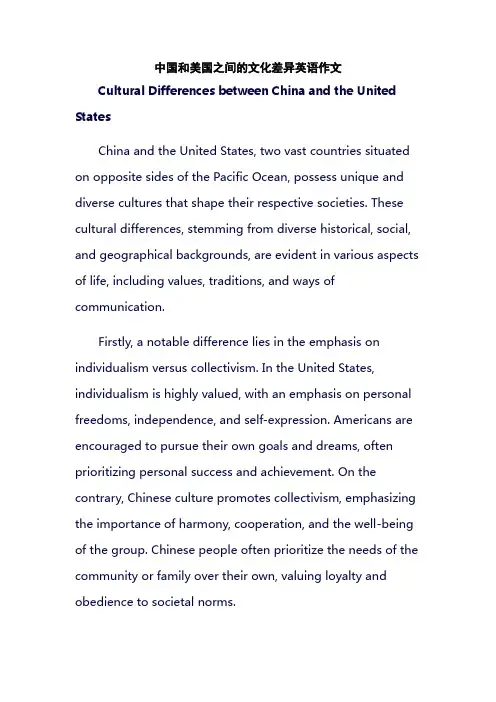
中国和美国之间的文化差异英语作文Cultural Differences between China and the United StatesChina and the United States, two vast countries situated on opposite sides of the Pacific Ocean, possess unique and diverse cultures that shape their respective societies. These cultural differences, stemming from diverse historical, social, and geographical backgrounds, are evident in various aspects of life, including values, traditions, and ways of communication.Firstly, a notable difference lies in the emphasis on individualism versus collectivism. In the United States, individualism is highly valued, with an emphasis on personal freedoms, independence, and self-expression. Americans are encouraged to pursue their own goals and dreams, often prioritizing personal success and achievement. On the contrary, Chinese culture promotes collectivism, emphasizing the importance of harmony, cooperation, and the well-being of the group. Chinese people often prioritize the needs of the community or family over their own, valuing loyalty and obedience to societal norms.Another significant difference is in the approach to communication. Americans tend to be more direct and outspoken in their communication, favoring frankness and openness. They often value honesty and straightforwardness, even if it means delivering critical feedback or voicing different opinions. In contrast, Chinese communication is often more indirect and subtle, with an emphasis on politeness, tact, and harmony. Chinese people may use circumlocution or euphemisms to avoid direct conflict or to show respect for others.Furthermore, the two countries have different views on time and punctuality. In the United States, time is often seen as a valuable resource, and punctuality is highly valued. Americans tend to adhere strictly to schedules and deadlines, viewing tardiness as a sign of disrespect or lack of professionalism. In China, however, the concept of time is more flexible, and punctuality is not always as strictly observed. Chinese people may be more lenient towards minor delays or deviations from schedules, viewing them as less significant than maintaining interpersonal relationships.Additionally, the two cultures differ in their approach to social hierarchy and status. In the United States, there is a strong belief in equality and the idea that everyone has the potential to succeed regardless of their social background. While social classes exist, they are not as rigidly defined as in some other cultures. In China, however, social hierarchy and status play a more significant role. Respect for elders, authority, and traditional roles is deeply ingrained in Chinese culture, and individuals are often expected to conform to their assigned social roles and positions.In conclusion, the cultural differences between China and the United States are vast and diverse, reflecting the unique historical, social, and geographical backgrounds of these two countries. Understanding and respecting these differences is crucial for promoting cultural exchange and fostering mutual understanding between the two nations.。
中美文化差异(CultureDifference)中美文化差异(Culture Difference):种族National raceThe whole question of the changing role of Blacks in American society as been the subject of newspaper articles around the world so frequently that visitors to the United States do not know what to expect when they arrive. They may be surprised when they see that Blacks and Whites work side by side in offices , factories , and schools across the country . The majority of Blacks in the United States, however, live in and around only a small number of American cities.Many dark-skinned visitors arrive in the United States fearing personal attack or expecting various degrees of racial prejudice. Some forms of discrimination still exist ,unfortunately, especially in the areas of the housing , schools , and jobs . The school equality is still more a dream than a reality. There are still too many areas of the country where Black Americans do not enjoy the same full opportunities as White Americans . However, the vast majority of American s are working, studying, and sharing public places together. This was not true even a few years ago in some parts of the country, but progress is steadily being made. You will be able to observe the improvement in race relations as soon as your plane lands . You will see it in the airport, in public buses and trains , in theaters , restaurants , rest room, in sops and libraries , in offices and factories . Close personal friendships between Blacks andWhites , full trust and social relationships are still not common , except in certain areas,However, even in this - the slowest area of progress-there has been change , especiallyamong young people.文化差异(Culture Difference):财富与特权Wealth and PrivilegeOwning cars , large houses , or swimming pools mean different things in different cultures and may confuse a visitor to the United States . In many nations , only the rich have such things as cars and swimming pools ; the poor have very little.By contrast, this is not true in the United States . The cost of certain things that only the rich can afford in other countries is relatively low. This means that laborers , farmers , and people who are not usually regarded as rich nevertheless have many possessions tat only the rich have in other nations . Understandably a visitor may assume that all Americans who own cars are as rich as people in his own country who own cars . Actually , this is not the cases; secretaries, university students , factory workers or farmers can and do buy cars and many other "expensive " things . Generally , they pay for these possessions gradually , during a period of many months , or even years , so that the cost each most is not too high in relation to their monthly wages .文化差异(Culture Difference):个人的进步Personal ProgressIn many parts of the world , personal influence is essential in achieving success. This is not true in the United States, where success usually results from hard work , education, skill, and personal initiative , America is truly a"do-it-yourself" society ; success is not dependent on family origins or the help of an influential person . Personal progress is the result of individual effort.Because effort and initiative are so important in America ,there are many customs that may be different from those practiced in other countries. For example , it is not considered dishonorable to quit a job, even if you have had it for only a short time . Moving from job-to -job , or "job-hopping ", as it is called , is quite acceptable in the United States. Frequently , the opportunity to change jobs offers workers a chance to move up to a better position. Americans like to move from place to place trying new jobs, meeting new people and living in different parts of the country. "Job-hopping" also gives employers a chance to benefit from the new ideas and skills that different people bring to their jobs even if such people are employed for only a short time.文化差异(Culture Difference):真实还是礼貌?Truth or Courtesy ?Just as the degree of individual freedom that exists in America seems loose and therefore uncomfortable to many visitors . In many countries , people will tell you what they think you want to here , whether or not itis true. To them , this is the polite thing to do. To Americans it is considered confusing -even dishonest -to avoid telling the true facts. even if avoiding the truth is done only to be polite . It is helpful to remember that different cultures consider some matters more important than others . Wit Americans , however, trust and truth are most important. One of the worst tings that can be said about someone in America is that " you cannot trust him"Considering such differences in values among the many cultures of the world, it is natural that misunderstandings [1] will occur. "How far is it to the next town?" an American asks a man standing by the edge of a road. In some countries , because theman realizes the traveler is tired and eager to reach the next village, he will politely say , ' Just down the road ". He thinks this is more encouraging, gentler, and therefore the answer the traveler wants to hear. So the American drives alone for many more hours before he comes to the village. The traveler is angry, feeling "tricked". He thinks that the man has purposely lied to him because he must have know quite will well what the distance was.If a visitor to the United States asked an American standing at the edge of a road how far the next town was, the American would think it dishonest if he said it was near when he knew it was really 24 miles away. Although he, too, would be sympathetic with the tired traveler , he would say, "You have a long way to go yet ; it is at least 24 miles more. " Thetraveler might be disappointed , but he would know what to expect, and there would be no misunderstanding.文化差异(Culture Difference):美国社会正在改变American Society is ChangingIn many nations , everyday activities are done in a planned , orderly manner. For example , formal relationships among people may be determined according to customs and habits that have existed for a long time . People visiting an informal country , such as the United States , may find that the American belief in personal initiative or freedom (including the freedom to disagree with those in authority ), and the whole economic system is quits confusing and uncontrolled . To some visitors such freedoms are too "loose" and too disorganized to be comfortable.Today , the United States is experiencing great change in every part of society ;therefore life in America may indeed seem confused . Social attitudes are being questioned . Americans arewondering: "Is there any morality ?""Why has the nation never given all of its citizens full opportunity ?""What courses should be taught in school?""What is the role of women in society ? "As visitors , you will notice that some Americans are beginning to leave the cities and make their homes in small cities and towns where life is quieter and slower . Political beliefs are changing . The kinds of skills needed by workers today differ from those in demand several years ago.文化差异(Culture Difference):权威AuthorityIn many countries , authority is seldom , if ever, questioned , either because it is highly respected , or because it is feared . Sometimes , too, Because rank has been important in certain societies for a long time, people have been trained never to question those in authority .. For example , children are not expected to question their teachers in school .It may be considered improper for young businessmen to suggest ideas that differ from those of older, more experienced members of the business.In other countries, including America, children are trained to question and search for answers . When a child asks a question, he will often be told to go to the library and find the answer for himself. By the time students reach the age of 14 or 15, they may be developing exciting new ideas in all fields of science and the arts . To encourage such creativity [1] , there are many national prizes offered to students , every year for their scientific discoveries and artistic accomplishments.This interest in questioning and searching may be considered by some people as bad for young people's manners , that young people lack respect for authority . This impression may be createdwhen visitors notice young Americans asking questions and arguing with older people . However , this is because many Americans have a different attitudetoward authority than may exist in other areas of the world . In a work or business situation, ideas are freely and openly discussed and argued. It is important to remember tat it is the person's ideas that are being questioned, not the individual himself..The two are quite separate. The purpose of the searching , questioning , and arguing is to find the facts in a particular situation, and therefore a solution, so that the work of the business can progress in the most effective manner possible.As was mentioned earlier, you may notice the some questioning in social conversations . Although some individuals may think that Americans are rude because of their direct manner with people, they are merely trying to learn more about your ideas.文化差异(Culture Difference):Table Manners: a Cultural DifferenceFor many Westerners, the Chinese dinner table is terra incognita([拉]未发现的地域). There are no forks or knives for the Westerners to use. The Chinese host makes great, sweeping(大范围的)arm movements that go over large sections of the table passing over both food and friends alike. The scene is fantastic (非常好的), but it leaves many foreigners at a loss(让……迷惑)for what to do. In most Western restaurants and homes there are rules about how to talk, eat and sit that are highly restrictive(受限制的), and they create an atmosphere(气氛)that is completely different from what we find here in China. In my childhoodhome, dinner was enjoyed with hushed(压低声音的) voices,and the topics open for discussion were very much restricted. We were not allowed to bring up anything that was potentially unappetizing(倒胃口的); body functions(上洗手间), bugs, murder and mayhem(使人肢体伤残的行为)in general were all strictly forbidden topics. If I had to leave the table to use the toilet, I had to verbally excuse myself without mentioning what it was that I was going to do. "May I be excused, please?I need to wash my hands." I would say.My mother would say, "Sure." My father would often play a joke on us by saying, "Your hands don't look dirty to me!"As for eating, we did it quietly. No eating noises were allowed.Everything must be done as quietly as possible. Therefore, we had to eat with our mouths closed. To make a "smacking" noise was, perhaps, the worst offence possible. While drinking soup or coffee or wine "slurping"(咕嘟咕嘟地喝)was also forbidden. If any sound whatever was created by our intake of food or beverage(饮料), it constituted(构成)bad manners! With that in mind, it was, of course, unthinkable to speak with one's mouth full of food, so speaking only occurred(发生)before or after one had taken in food and swallowed(吞咽)it.How one sits at the table is also prescribed(被规定的). One is to sit up straight with the recessive(非主导的,隐性的)hand (usually the left) in one's lap holding a napkin(餐巾)while the dominant hand (usually theright) holds the fork or spoon. The only time one is allowed to have both hands on the table is when one is using a knife to cut something, but as soon as the cutting is done, the recessive hand goes back to the lap. Also, elbows(肘)are not allowed on the table. Therefore, one props(撑着)the arm against the edge of the table just below the elbow. One should never reach for(伸手拿)any food on the table; one should ask someone sitting near it to give it to you. "Would you please pass the potatoes?" "May I trouble you for the salt?" These are phrases that you are likely to hear on any given night of the week at a family dinner.When a guest comes from the West to enjoy a meal with you, it would be a good idea for you to explain to your guest what will happen at dinner and to find out if a fork would be easier to use than chopsticks(筷子). In my time in China, I have come to enjoy Chinese table manners far more than those prescribed by my own culture, but for many it is impossible to adjust(适应). The best policy is to ask your guest questions to find out what he or she is comfortable with.文化差异(Culture Difference):社会SocietyThe United States, like other countries has its rich and poor people , its rich and poor neighborhoods.Americans love --- and many are themselves living examples of ---the "self-made man. "You will hear this expression often. But forevery person who is successful. They are usually better educated tan their parents and therefore more likely to have good, well paying jobs.In addition to the fact that the United States includes people whose families originally came from many other parts of the world , Americans move across the nation in great numbers. One study reported that one of every five families in the United States moves every three years. This continuous mixing of people into new communities is an important observation to consider when trying to understand the meaning of class in America. We have already discussed the questioning, "do-it -yourself" Americanpersonality that is another important consideration.In many countries, a man's social class is determined at birth . That is , his social class or position is shared with his family , his wider group of relatives . In the United States , position in society is , to a large degree, personal rather than related to family or group.Before World War Two, family ties were more important America than they are now. Uncles, aunts grandparents , and children vacationed together, spent holidays together, and saw much of each other. But as the American economy developed more rapidly after the war, social customs began to change. With the rapidly growing economy, there were new employment opportunities, many of them in scientific fields. These opportunities were often located in other parts of the country. The younger members of many families who were will educated began tomove away from the towns where their families lived to tale these new jobs. As these young people became successful, they often moved into a new social stratum [1], consisting of others who, like themselves, moved away from home to follow job opportunities.These same changes are already happening in most new countries around the world. Today, a man who can read or fix a machine may become the new leader of his community in place of an older person. Often young people can better understand the new sciences and modern skills ; as these young people learn and advance , their wages rise and they become increasingly successful.Frequently, it is just one member of a family that becomes very successful. Other members continue working at theiraverage jobs and salaries, without much chance of becoming as successful as the son or daughter. When this happens, people sometimes become separated from their family. Many return to visit, but others move away never to return to their relatives and old friends.To many people, success means having more power than one possessed before. It can be won through skill, knowledge , leadership, or sometimes just by hard work .In America, "success" has normally bee accompanied by an increase in wealth. As a result, an individual 's social position is determined both by a person's job and by the kinds of possessions he owns .As we said , however, young people are in the process of developing different values and different ways to measure success.[1] stratum n. [地] 地层, [生](组织的)层, 社会阶层。
中国和美国的文化有哪些不同1.社会结构:在中国,家庭是社会生活的核心。
中国有着强烈的家庭价值观念,重视家庭内部的亲密关系和责任。
相比之下,美国强调个人的独立和自由,重视个人的成就和个人权利。
2.教育体系:在中国,教育被视为一种机会,为孩子提供良好的教育是家长的一种责任和优先考虑。
在美国,教育也很重要,但更注重培养学生的创造力和独立思考能力,鼓励学生追求自己的兴趣和激发潜能。
3.礼仪和礼节:在中国,礼仪和礼节非常重要。
人们会更注重面子和尊严,在公共场合中尽量避免表达直接的批评或拒绝。
而在美国,人们更注重诚实和直接表达,通常更愿意接受直接的反馈和建议。
4.饮食文化:在中国,人们喜欢与家人或朋友一起分享大餐,讲究菜肴的味道、形状和色彩。
餐桌礼仪也非常重要。
而在美国,餐桌上通常会有更多种类的食物和饮品,但餐桌礼节相对简单,更注重交流和享受。
5.宗教信仰:在中国,佛教、道教和儒家思想对文化和社会起着重要的影响。
大部分中国人没有宗教信仰,但仍然会尊重传统和祖先。
相比之下,美国有着多元的宗教信仰,信仰自由是美国宪法所保护的基本权利。
6.社交习俗:在中国,人们重视面子和社交阶层,礼貌和尊重他人的地位非常重要。
人们可以通过送礼或请客来建立和维持人际关系。
而在美国,人们更注重平等和尊重个人的自由和权利,在社交场合中更注重自由的表达和意见交流。
7.婚姻与家庭观念:在中国,传统观念中婚姻被视为家庭的基础,大多数人倾向于把婚姻视为一生的承诺。
而在美国,人们普遍更注重婚姻的个人幸福和互惠关系,离婚率相对较高。
8.对待时间的态度:在中国,人们对时间有着不同的看法。
虽然中国现代社会越来越注重效率和准时,但仍然存在“中国时间”的现象,人们在处理事务时更注重灵活性和忍耐力。
而在美国,准时是一种重要的文化价值观念,人们更注重时间管理和效率。
9.艺术和传统文化:在中国,传统文化和艺术形式,如京剧、曲艺、书法和绘画,一直以来都受到推崇和传承。
中美文化差异摘要:文化的不同,会产生思维模式的不同;思维模式的不同,又会产生行为方式和社会关系的不同。
中国文化重集体,美国文化重个人;中国文化重综合,美国文化重分析:中国与美国具有不同的风俗习惯和宗教信仰,在非言语交际上也各有不同。
现在从饮食、戏剧、教育以及婚恋观来浅析一下中美的文化差异。
关键词:中国文化美国文化差异一、从饮食看中美文化差异餐饮产品由于地域特征、气侯环境、风俗习惯等因素的影响,会出现在原料、口味、烹调方法、饮食习惯上的不同程度的差异。
正是因为这些差异,餐饮产品具有了强烈的地域性。
中美文化之间的差异造就了中美饮食文化的差异,而这种差异源于中西方不同的思维方式和处世哲学。
中国人注重“天人合一”,美国人注重“以人为本”。
这主要体现在以下两点:1.两种不同的饮食观念对比注重“味”的中国饮食,美国是一种理性饮食观念,不论食物的色、香、味、形如何,营养一定要得到保证,美国人讲究一天要摄取多少热量、维生素、蛋白质等等。
即便口味千篇一律,也一定要吃下去——因为有营养。
这一饮食观念同美国以至于西方的整个哲学体系是相适应的。
形而上学是西方哲学的主要特点。
西方哲学所研究的对象为事物之理,事物之理常为形上学理,形上学理互相连贯,便结成形上哲学。
而中国人是很重视“吃”的,“民以食为天”这句谚语就说明我们把吃看得与天一样重要。
由于我们民族几千年来都处于低下的生产力水平,人民总是吃不饱,所以才会有一种独特的把吃看得重于一切的饮食文化,这大概是出于一种生存需要。
如果一种文化把吃看成首要的事,那么就会出现两种现象:一方面会把这种吃的功能发挥到极致,不仅维持生存,也利用它维持健康,这也就是”药补不如食补”的文化基础;另一方面,对吃的过份重视,会使人推崇对美味的追求。
在中国,饮食的美性追求显然压倒了理性,这种饮食观与中国传统的哲学思想也是吻合的。
作为东方哲学代表的中国哲学,其显著特点是宏观、直观、模糊及不可捉摸。
2.饮食方式的不同中美的饮食方式有很大不同,这种差异对民族性格也有影响。
中国和美国文化差异的深度剖析一、引言中国和美国作为世界上最大的两个国家之一,在文化方面存在着显著的差异。
文化的差异不仅仅体现在语言、饮食、礼仪等方面,更深层次的差异反映了两个国家的价值观、思维方式和社会结构。
本文将从几个重要的方面,对中国和美国文化差异进行深入的剖析。
二、价值观的差异中国和美国在价值观上存在着较大的差异。
中国强调集体主义、家庭观念和传统价值观,重视孝顺、忠诚和尊重。
而美国则更加注重个人主义、独立精神和自由。
个体权利在美国文化中被高度重视,强调自我实现和追求幸福感。
这种价值观的差异在两个国家的社会行为和思维方式中得到了体现。
三、社会结构和组织方式的差异中国和美国的社会结构和组织方式也存在着巨大的差异。
中国是一个传统的农耕社会,重视家族和亲戚关系,社会结构较为等级化。
而美国则是一个相对年轻的国家,社会结构较为平等,强调个人的努力和能力。
美国注重竞争和个人的成就,社会地位主要取决于个人的能力和努力。
四、沟通方式和交际习惯的差异中国和美国在沟通方式和交际习惯上也存在着一定的差异。
中国人注重间接的沟通方式,善于运用非言语表达来传递信息,尤其重视面子和人际关系。
而美国人则更加直接和开放,注重言语表达和直接交流。
他们更加注重实事求是和直接解决问题,不喜欢拐弯抹角和迂回的沟通方式。
五、时间观念和效率意识的差异中国和美国在时间观念和效率意识方面也存在明显差异。
中国人注重过程和关系,更加重视维护人际关系和多次交往。
时间观念较为弹性,强调“人情味”,往往会迟到或者延迟。
而美国人则更加注重效率和时间管理,重视守时和高效工作。
他们注重事情的结果和效果,喜欢迅速解决问题。
六、饮食文化的差异中国和美国的饮食文化也存在着明显的差异。
中国饮食以米饭、面食、蔬菜和豆制品为主食,强调均衡膳食和食物的烹调方式。
中国人注重“饭圈文化”,喜欢团体用餐和分享食物。
而美国饮食以肉类、快餐和甜食为主,追求方便和快捷。
美国人注重个人的饮食习惯和口味选择,更加重视营养和健康。
中国文化与美国文化的差异
中国文化与美国文化有很多方面的差异,它们代表不同文明背景和思维模式。
首先,中美文化之间有不同的价值观和传统观念。
他们持有完全不同的文化价值观,
中国传统价值观强调仁、义、勤、奉礼等理念,而美国则强调欲望、独立、自主、成功等
价值观。
这些价值观回影响到国家的政策和立法,也影响了个体的行为和世界观。
另外,
中国拥有几千年的历史文化传统,而美国则有西方现代文化的色彩。
其次,中国和美国有不同的社会家庭关系。
中国以家庭为基本社会单元,认为家庭中
心是人们朴实、完整、幸福的生活。
在社会关系中,中国人崇尚关系主义,比如依靠亲戚
和朋友的帮助,而美国的社会更加自由开放,更注重个人,注重个性。
人们关注获得收益,与不同社群摩擦出竞争与发展的机会,而不是亲情。
此外,中国的社会风气与美国有很大的差异。
中国是一个老百姓的文化,无论贫富,
人们都强调团结友爱、懂得珍惜一切。
而美国则更加强调自由主义,感情容易被剥夺;虽
然美国也有施以此法律保障对其他劳动者的权益,但在政绩、职业机会等具体的利益问题上,每个人的遭遇与获得可能不同。
最后,中美文化是完全不同的,在文化交流过程中,要增进相互的认知和沟通,需要
打破文化藩篱,以及破除文化偏见,才能够提高双方文化之间的互动和理解。
总之,从社会、价值观和历史文化等方面来看,中美文化有着明显的不同,这些差异会影响到人们在
意识形态和行为习惯上的发展。
比较中国文化与美国文化的差异
中国文化与美国文化的差异可以从多个方面进行比较。
以下是一些主要方面的比较:
一、价值观和传统习俗:
中国文化注重家族和社区的集体利益,强调家庭的重要性和孝顺的传统。
而美国文化注重个人主义,重视独立和自由。
在中国,尊重长辈、传统节日的庆祝活动和拜神仪式都是很重要的传统习俗。
而在美国,个人的权利和独立被普遍重视,建立无拘束的个人关系,个人成就和追求幸福是很重要的价值。
二、社交和人际关系:
三、教育和思维方式:
中国文化对于教育的重视程度较高,注重传统的学术知识和道德的培养。
教育强调知识的灌输和考试成绩的重要性。
而美国文化注重实际的应用和实际技能的培养。
教育重视培养学生的创造力和创新思维。
四、工作和商业习俗:
中国文化中强调工作和商业中的关系网络,个人关系对于获得资源和机会起到重要作用。
个人关系比技术能力更加重要。
而美国文化中,业务和工作以合同和法律为基础,更强调公平竞争和职业道德。
五、宗教信仰:
中国文化中有多种宗教信仰,但相对来说以儒教、道教和佛教为主。
宗教信仰在中国文化中起到很重要的作用,影响了人们的价值观和行为准则。
相比之下,美国作为一个移民国家,信仰多元化,不同的宗教信仰以
及无宗教信仰的人群都有一定数量。
宗教信仰在美国没有像中国那样对整个社会产生影响。
在这些差异之间,也存在一些共同之处。
例如,中国和美国都有独立的文化和历史,并都注重家庭和社区的重要性。
不同文化之间的了解和交流有助于推动文化的多元发展和相互间的理解。
中美文化差异(Culture Difference):
种族National race
The whole question of the changing role of Blacks in American society as been the subject of newspaper articles around the world so frequently that visitors to the United States do not know what to expect when they arrive. They may be surprised when they see that Blacks and Whites work side by side in offices , factories , and schools across the country . The majority of Blacks in the United States, h owever, live in and around only a small number of American cities.
Many dark-skinned visitors arrive in the United States fearing personal attack or expecting various degrees of racial prejudice. Some forms of discrimination still exist ,unfortunately, especially in the areas of the housing , schools , and jobs . The school equality is still more a dream than a reality. There are still too many areas of the country where Black Americans do not enjoy the same full opportunities as White Americans . However, the vast majority of American s are working, studying, and sharing public places together. This was not true even a few years ago in some parts of the country, but progress is steadily being made. You will be able to observe the improvement in race relations as soon as your plane lands . You will see it in the airport, in public buses and trains , in theaters , restaurants , rest room, in sops and libraries , in offices and factories . Close personal friendships between Blacks and。